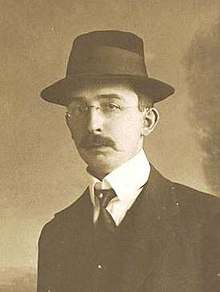Bernhard Gregory
Bernhard Gregory (22 April [O.S. 10 April] 1879 in Tallinn – 2 February 1939 in Berlin) was a Baltic German chess master.[1]

Life
Bernhard Gregory was born on 22 April [O.S. 10 April] 1879 in Reval, Governorate of Estonia, Russian Empire (now Tallinn, Estonia) as a son of advocate Ferdinand Oscar Gregory (born 1843 in Kolu Manor, Heinrichshof, now in Vaiatu village) and Alexandrine Emmi Gregory (born 1854 in Vändra). Bernhard studied at the Dome School of Reval from 1885 to 1893. In 1898 he moved to Munich to study chemistry and engineering, which he later continued in Berlin. In 1902 he married at the age of 23 with an 18-year-old Ida Hempel from Leipzig. The couple lived in Schöneberg, Berlin, and had two daughters, Iselin (1903) and Maud Dolly (1905). In 1914 the couple divorced, Ida moved back to Leipzig with the daughters.[2]
Chess
In 1902, he tied for 16–19th in Hannover (13th DSB–Congress, Hauptturnier, Walter John won). In 1903/04, he tied for 9–10th in Berlin (Horatio Caro won). In 1904, he shared 1st in Reval, and tied for 7–8th in Coburg (14th DSB–Congress, Hauptturnier, Augustin Neumann and Milan Vidmar won).[3] In 1905, he took 6th in Barmen (D tourn, Georg Schories won), and tied for 14–15th in Berlin (Erich Cohn won). In 1906, he took 5th in Nuremberg (15th DSB–Congress, Hauptturnier, Friedrich Köhnlein won). In 1907, he tied for 6–7th in Berlin (František Treybal won). In 1908, he took 2nd, behind Wilhelm Cohn, in Berlin. In December 1908, he lost a match to Frank James Marshall (1 : 4) in Berlin.
In 1909, he took 3rd in St Petersburg (All-Russian Amateur Tournament, Alexander Alekhine won). In 1910, he tied for 14–15th in Hamburg (17th DSB–Congress, Hauptturnier, Gersz Rotlewi won), and took 5th in Berlin (Richard Teichmann won). In 1912, he won in Breslau (Wroclaw) (18th DSB–Congress, Hauptturnier).[4] In 1913/14, he tied for 17–18th in St Petersburg (All-Russian Masters’ Tournament, 8th RUS-ch, Alekhine and Aron Nimzowitsch won).[5] In 1917, he took 9th in Berlin (Paul Johner and W. John won).
After World War I, he took 3rd at Berlin 1919 (Triangular, W. John won). In 1920, he tied for 6–7th in Berlin (Alexey Selezniev won).[6] In 1921, he took 12th in Hamburg (21st DSB–Congress, Ehrhardt Post won). In 1927, he took 13th in Berlin (Berthold Koch won).[7]
He played in the following team matches: Berlin vs Vienna in 1911, Berlin vs Prague in 1913, and Berlin vs Holland (by telegraph) in 1920.[8]
References
- Berliner Schachverband :: Bernhard Gregory Archived October 6, 2007, at the Wayback Machine
- "Bernhard Gregory" (in German). Berliner Schachverband e.V. Archived from the original on 5 April 2013. Retrieved 14 January 2013.
- coburgb
- Deutschen Schachkongresse Archived 2011-12-04 at the Wayback Machine
- "Chess Tournaments: Russian masters 1913/14". Archived from the original on 2011-09-03. Retrieved 2007-07-22.
- Berliner Schachverband :: BSZ – Berliner Schachzettel 51 bis 60 Archived October 21, 2007, at the Wayback Machine
- "Archived copy" (PDF). Archived from the original (PDF) on 2007-07-04. Retrieved 2011-12-05.CS1 maint: archived copy as title (link) Name Index to Jeremy Gaige's Chess Tournament Crosstables, An Electronic Edition, Anders Thulin, Malmö, 2004-09-01
- Welcome to the Chessmetrics site Archived April 14, 2006, at the Wayback Machine
External links
- Bernhard Gregory player profile and games at Chessgames.com